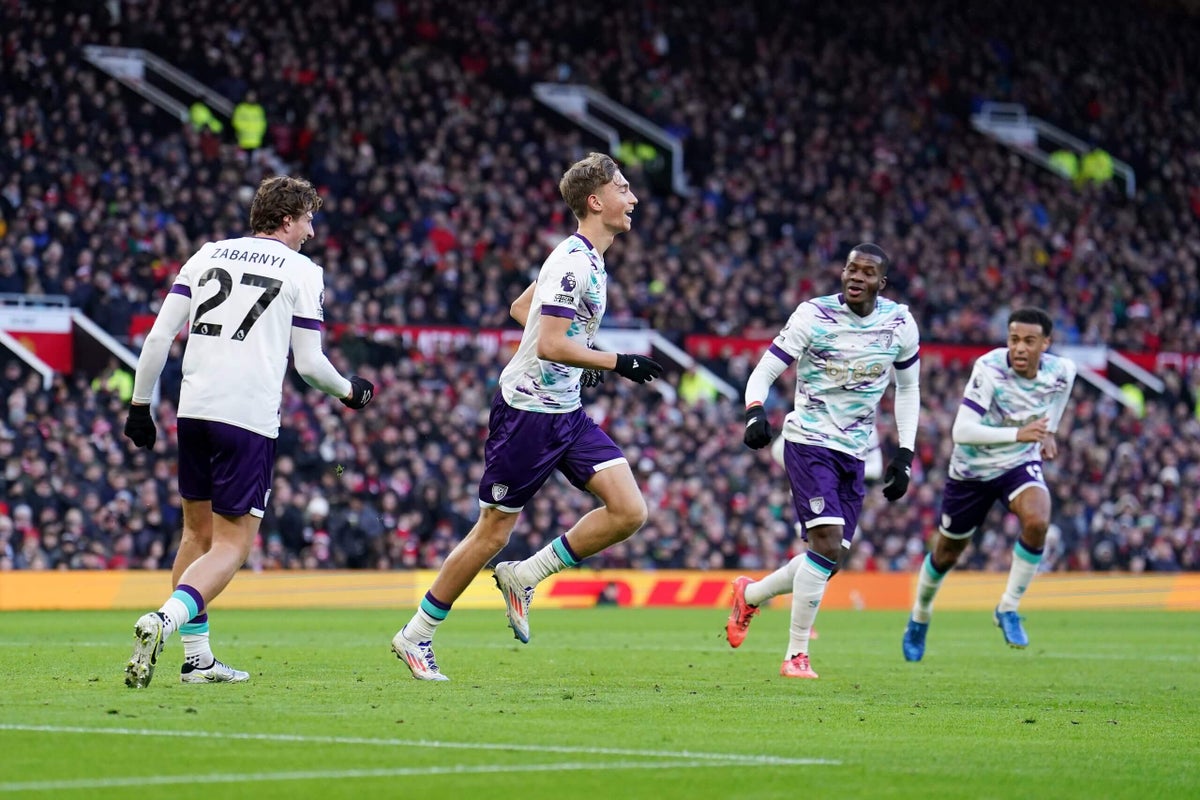After the high of their dramatic derby victory last Sunday, Manchester United were brought back down to earth in the Premier League with a heavy home defeat against Bournemouth.
Ruben Amorim and his team have experienced wildly contrasting fortunes over the past seven days. There was euphoria as two late goals earned a 2-1 win at the Etihad Stadium a week ago, but now they have suffered back-to-back disappointments in exiting the Carabao Cup quarter-finals after a seven-goal thriller at Tottenham Hotspur, followed by this dismantling.
United, with Marcus Rashford still absent from the matchday squad, struggled to create clear opportunities. Bournemouth took the lead when Dean Huijsen rose highest from a wide free kick to glance a header beyond Andre Onana, continuing United’s issues defending set pieces (more on that below).
The visitors doubled their lead around the hour mark after Noussair Mazraoui brought down Justin Kluivert in the area with a rash tackle and Kluivert stepped up to convert the penalty. Things got even worse for United a couple of minutes later, when Antoine Semenyo made it 3-0 with a precise finish.
This defeat leaves United 13th in the 20-team table, while Bournemouth are up to fifth.
Mark Critchley analyses the main talking points.
Bournemouth a blueprint for what United would like to be
Well-drilled in their duties, aggressive out of possession, more than the sum of their parts: Bournemouth are everything United have not been since the start of last season, everything that Amorim is trying to achieve.
This is the worst result of the United manager’s short spell in charge so far but it should not come as a surprise.
Noussair Mazraoui committed himself and mistimed his tackle on Justin Kluivert (Darren Staples/AFP via Getty Images)
Some of the underlying numbers rate Andoni Iraola’s side as the third-best team in the league this season. They have beaten Arsenal, Manchester City and Tottenham already.
All those victories came at the Vitality, though. This is their first Big Six scalp away from home of the campaign and, in fact, their first since exactly the same result on the same ground around this time last year.
For Bournemouth to repeat such a result shows how much progress Iraola is making, how little has changed at Old Trafford in the intervening period, and how much of a task Amorim has on his hands.
Why are United struggling to stop set-piece goals?
Another week, another goal conceded from a set piece for Manchester United. It is becoming a glaring Achilles heel, one that has come to the fore on Amorim’s watch, and undermines the out-of-possession improvements in open play.
In United’s defence, they have played the three most effective set-piece sides in the league of late.
Huijsen’s goal was Bournemouth’s seventh from a deal-ball situation — the second-most alongside Nottingham Forest. Only Arsenal have scored more. That’s three of United’s past four league opponents.
But even in that context, it is hard not to question United’s current approach to set plays when Joshua Zirkzee — a big but not aerially-dominant striker — was left to mark Bournemouth’s 6ft 5in (196cm) goalscorer.
It is nine in total conceded from set plays this season now — only Wolverhampton Wanderers have let in as many — but it is also five in a short spell.
Huijsen’s opener followed Josko Gvardiol’s last week, Nikola Milenkovic’s the week before that, and Jurrien Timber and William Saliba a few days before that. It needs fixing quickly.
How do they stop the trend of conceding first?
Just as worrying as United’s pattern of conceding from set pieces should be this new-found habit of going behind first. For the sixth consecutive game, United gave themselves a mountain to climb and this time, they did not pack their crampons.
You can’t climb mountains every three days anyway. Because as spirited as the fightbacks in Plzen and at the Etihad were, with plenty of fight in defeat at Tottenham on Thursday night too, any team will eventually suffer if they keep giving themselves too much to do.
It’s not so much a case of starting slowly — United are not always conceding especially early in games, going in level at the break against Arsenal and Viktoria Plzen — but they are struggling to impose themselves on opponents from minute one.
It is quite a departure from the fast starts in Amorim’s opening games against Ipswich and Bodo/Glimt. But then even in the second of those, United were forced to come from behind. It is another concerning trend.
What did Amorim say?
We will bring you this after he has spoken at the post-match press conference.
What next for Manchester United?
Thursday, December 26: Wolves (A), Premier League, 5.30pm GMT, 12.30pm ET
Recommended reading
(Top photo: Martin Rickett/PA Images via Getty Images)

